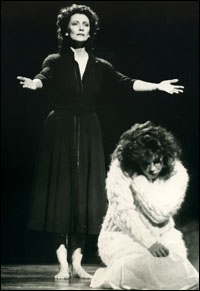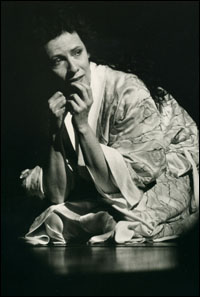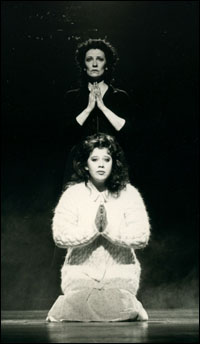
Buckley, who also appeared as gym teacher Miss Collins in Brian De Palma's 1976 film of the Stephen King novel "Carrie," delivered a performance full of fire and brimstone on stage as Margaret White, a religiously devout mother who is convinced she must save her daughter from damnation with bloody results.
It seems almost everyone in the theatre community has a story (second hand, or otherwise) about Carrie, or claims to have seen it several times during its short run.
With Carrie fresh on the minds of theatregoers thanks to a reworked Off-Broadway revival at MCC Theater, Playbill.com thought it was best to get some insight from someone who was there – for every performance – Tony Award winner Buckley, who chats about about her experiences in the original film and Broadway production.
First impressions of Carrie the musical.
BB: Dean [Pitchford] and Michael [Gore] and Larry [Cohen] called me when they were originally writing it and said they were turning "Carrie" into a musical and they wanted me to play Margaret. I was really surprised. I didn't think that it would easily lend itself to be musicalized. But, when I heard their score, I was really knocked out by it. It's very operatic in proportion and very passionate and dramatic music. I thought it was great.
Working with co-star Linzi Hateley, who made her Broadway debut in the title role.
BB: Linzi was 17 years old and a very young actress and had never done a Broadway show before. I'd been an acting coach for a gazillion years, so I told her to really trust me and keep her eyes on my eyes. We did some improvisational work so that we had a real spontaneous reality between us, and she was a fantastic colleague onstage. She was amazing — really, really strong. So, in the rehearsal room by ourselves with the director, Terry Hands, we created, I think, a very authentic psychological portrait of a mother and daughter – an abusive mother to this young, gifted girl. We created these sequences that were very violent. Linzi was just really amazing, and she trusted me implicitly.
| |
 |
|
| Betty Buckley and Linzi Hateley in Carrie. | ||
| photo by Peter Cunningham |
BB: I did the dance warm-up each morning with Debbie Allen and the company, and she had me run wind-sprints to get me strong enough to sing the stuff. Linzi and I were literally having a physical fight during "And Eve Was Weak" while I was chasing her around the stage and trying to throw her in this basement. There were five verses to that song and, at the ending, I belt this G. I was amazed! [Laughs.] And I was astonished that I could do it!
Reflecting on Carrie's reception and the first preview performance.
BB: I was really, really proud of the work we did. The first time we presented it to the company in the context of the first run, people were terrified and crying because it was very provocative work for the musical theatre. Honestly, I think Carrie, as a piece, was ahead of its time. Our first performance Linzi went out in her first number and stopped the show cold, which was amazing. I was backstage preparing to go on for this sequence in the house, and I went out and sang my first number and stopped the show cold, too. Our sequences were met with an incredible, very emotional response.
The fans.
BB: People would come in costume and would address us by name from the balcony. I remember one night, I'd go up on the elevator to the top of this great, white Aztec staircase for the end. I'm at the top of the stairs and somebody yells from the balcony, "Come on down, Betty Buckley!" There was this crazy energy in the theatre every time we did the show.
| |
 |
|
| Betty Buckley | ||
| Photo by Peter Cunningham |
BB: During the end, I come down the stairs with a kitchen knife behind my back, and I'm singing to Carrie this lullaby to comfort her after what she's been through. Then I stab her, and then she reaches over, stops my heart, and she climbs down a few more steps and dies. Then there's a last bit of music, a blackout, and the whole house starts booing, which I'd never heard before in the entirety in my career. My mind reeled back to these remembrances of the Survey of Theatre course in my freshman year of college with these stories of Jacobean drama creating riots in the audiences and Ibsen's plays creating riots, and I thought, "Oh my God! It's a bona fide theatrical riot! I've never experienced this. This is very exciting!" [Laughs.] And, Linzi's like three-feet away from the audience, and I was back up the stairs, so I was safe. [Laughs.] She turns around to me in the darkness — this wonderful, little 17-year-old dynamo — turns around to me in the dark, terrified, and says, "What do we do?," because she's trusted me through this whole thing, and I was like, "We have to get up!" I start laughing and we get up, and, as soon as the lights came up, the whole place went into this huge, unanimous standing ovation. In a moment, it went from boos to this massive, full-house standing ovation!
Opening night and the critics.
BB: We got very mixed reviews. People remember it only as being this massive flop, and it truly wasn't. It was provocative and startling and scary, and yes, there were also scenes in the school where the kids were dressed in togas and stuff, and it was just bizarre. There were songs that were just too over-the-top, but it was all those things. It was very dangerous, I think, this show, mainly because of what Linzi and I established as the center of truth in the piece. Some reviewers really gave us raves, and others really trashed us. Frank Rich, at the New York Times, for example, really loved Linzi's and my work. He loved those sequences, but he really wrote the review so that we couldn't lift a quote.
My opening-night remembrance was going to the party, hearing that we'd kind of been savaged and that we had good reviews, too. And, I left and was driving home alone in this limousine, and I pulled over to get a copy of the New York Times. I read the review, laughing, in the back seat because he had worded it so carefully that it was clear that he wanted to kill the show. He wouldn't even let us have that. He wouldn't even let us have quotes for Linzi and myself, and so, I thought, "Man, oh man! You really want it to die."
| |
 |
|
| Betty Buckley and Linzi Hateley | ||
| photo by Peter Cunningham |
On Carrie for a 2012 audience.
BB: I'm really glad for the guys — for the creative team — that they got this revival happening, and it's a new take on it. They've got a lot of new material, and I think it's awesome because the music deserves to be heard. It's definitively all-American, and the bullying theme—finally we're conscious of that as a culture. Dying for De Palma on screen.
BB: The death scenes were a riot. My death scene was this pendulum machine, which was the basketball backboard, and there was a foot of balsa wood where when the pendulum hits the wall, the balsa breaks against the body, so that we're (the stunt woman and I) not actually crushed in half—hopefully. But they never tested out the machines.
I remember right before they shot my sequence, they did this thing with our stunt coordinator, Dick [Ziker], where they threw him backwards across the room in this machine and he's supposed to land on mattresses. They overshot it, and he landed on the floor on his tailbone. He really injured himself, so I thought, "Oh, swell! They really know what they're doing, don't they?" So when it came time for my death scene, they had never run this machine to see if it worked. I was like, "Okay!" We shot four takes, four cameras of the machine coming down to crush me, and it's supposed to stop before it hits me each time. That's real terror on the film. That's not me acting at all because I was pretty sure it wasn't going to work. [Laughs.]
We, as a cast, all came to each other's death scenes because the death scenes went on for over a week in the prom sequence. Each time somebody was going to die, we would all come watch their death scene and go out afterwards and celebrate. It was really fun. It was a group of fun, wonderful young actors making our debut, and we had a good time making the movie.










